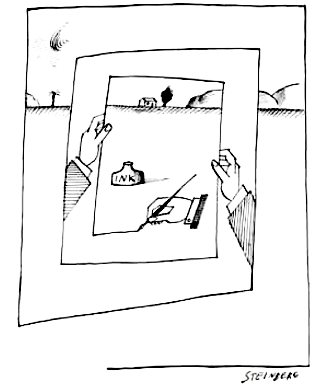More on credibility and objectivity
 Part two on this series, a few more bloggers weigh in...
Part two on this series, a few more bloggers weigh in...First, from saila.com:
Bias exists in news media from the minute the story is assigned (why did the editor choose that particular story?) to where it is placed on the page or in the broadcast. Reporters also are affected by bias — what questions they ask, the tone in which they ask those questions.From Apathy:
The dedicated reader/viewer can often go online and look at some of the same research a journalist did and compare it with the final story. Best of all, readers/viewers can contact journalists directly via email to follow up or comment on stories.
When you know the information came from a specific person/entity, how do you know to trust it? Obviously if it's on the internet, you don't inherently trust it much more than a talking can of tomato paste. The direct query is, specifically, how do you find out the originator's biases and entanglements?
From ModemJunkie, who says "Webloggers gamble their reputation with every link they offer."
- How do we discern troubling content? How can we validate what we find? And What can we do about it?
- One of the interesting things about the Internet is the ability of anyone, even me, to create and publish authentic looking, authoritative appearing documents for virtually no cost and with little effort. A bogus report on a serious subject looks just as official as the real thing. Using search engines, we can be led to official authority, unofficial commentary, and misleading or fraudulent material in the click of a mouse. In the face of such possibility questions must also be raised about the responsibilities of web authors.
Supreme Court Justice Potter Stewart once said of pornography -- "I know it when I see it." ... we must not accept anything we find at face value. When something doesn't seem right we must challenge it.- Is the material within the speciality or area of competence of the blogger?
- Does the blogger have strengths and weaknesses? Has the blogger's bias been demonstrated before? Is the questioned material consistent with that bias or not? Is it in the blogger's area of expertise?
- What is the source of the material?
- When something doesn't seem right, the first step one can take is to try to trace the source of the material.
... The material quoted by Barger did not come directly from the book. It came from a web page set up by Matt Nuenke [who] prefaced his quotations with several revelatory paragraphs of introductory comments. He describes himself as "a promoter of eugenics, nationalism and futurism."
Had this sentence, and perhaps a few more from the introduction been included in the selections quoted in the Weblog, perhaps it would have provided greater warning to the unsuspecting reader.
Technorati Tags: Media, Truth, Objectivity, Sources, Blog



 A few of my daughter
Melina's great posts:
A few of my daughter
Melina's great posts:








1 Comments:
Great set of posts.
This is why I generally stay away from issues in my blog. If I'm going to blabber on about a particular subject, I need some back-up. Where's the credibility in lots of the links? I've seen people link to sources as their "proof" and the sources are from sites with an agenda. Do I trust the entire post if it is based on something I don't find fair or balanced?
I'll stick with pop culture and those "life in general" posts, or the wonderful garden of informative posts like yours.
Post a Comment
<< Home